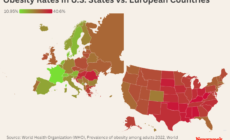-
Set your preferred web browser on your desktop and mobile devices - 6 mins ago
-
Immigration and an ailing economy dominate Germany’s election as far-right eye gains - 9 mins ago
-
9th Circuit clears Grindr in child sex trafficking case - 10 mins ago
-
Girl, 4, Teaches Little Sister About ‘Healthy Boundaries’ - 15 mins ago
-
College basketball weekend preview: Top five matchups to tune into Saturday - 35 mins ago
-
Heart-wrenching opening for trial of O.C. judge who fatally shot wife - 50 mins ago
-
DOGE Stimulus Check Creator Wants it to Motivate People to Report Waste - 54 mins ago
-
Body of Shiri Bibas handed over; release of six more hostages underway - 58 mins ago
-
Eagles LB Nolan Smith played through Super Bowl LIX with torn triceps - about 1 hour ago
-
Taylor Swift’s ‘It Ends With Us’ connection uncovered in resurfaced interview - 2 hours ago
Rising egg prices and high demand are prompting consumers to rent or buy chickens, but experts warn the move may not cut costs
Egg prices jumped more than 15% in January from a year ago, with a carton of eggs costing Americans roughly $4.95. Producers blame it on the bird flu that has forced them to euthanize millions of chickens.
With relief not expected anytime soon, some egg consumers are now looking for alternatives, including going to the source itself: Chickens.
Egg consumers search for alternatives
Across the country, several hatcheries who spoke with CBS News said they’re seeing significantly more interest in buying chickens.
“Sales have gone up dramatically for all the people I know that sell chickens,” Ron Goldsmith said.
Goldsmith said sales of feed for chickens at his pet store, Mike’s Feed Farm in Riverdale, New Jersey, have more than doubled since October.
“Every week, we’re selling probably 50% more than we did the prior week,” he said.
Renting hens has also taken off, with one company, Rent The Chicken, telling CBS News they lend out their chickens for six months at a time.
“There are a lot of considerations that go into making the commitment to keep chickens,” said author Kathy Shea Mormino. “If you travel a lot or have a job that keeps you away from home, most of the day, chickens are not a good pet for you.”
Known as the “chicken chick,” Mormino has been raising chickens in her Connecticut backyard for 20 years. She shares her experience on social media and wants people to do their research before committing to raising chickens.
She said not all municipalities may allow you to keep chickens, explaining there could be restrictions on the location of the coop, number of birds and more.
“The best thing to do is to contact the code enforcement officer in your town to request information about any limitations that may exist with respect to the legalities in your, on your property,” Mormino said.
Tips for saving on soaring costs
Experts say the costs of raising chickens can quickly add up. A backyard hen in her prime can lay up to five eggs per week, but consumers need to consider the initial cost of the coop, chicks and feed, which could cost thousands of dollars. Meanwhile if you bought a dozen eggs per week at the grocery store, it would be about $300 per year.
“I always say that they’re not just PEZ dispensers and they’re not giving us eggs,” Mormino said. “So how many eggs they lay a week is going to depend on how healthy they are, how young they are, what the seasonal influences are.”
But there are some tips to save on eggs as prices continue to soar. Experts at Good Housekeeping suggest substituting a fourth cup of Greek yogurt in place of an egg while baking. Liquid left over from a can of chickpeas can also be added to recipes, or whipped into an aioli-like spread in place of mayonnaise.
Bird flu impact
The H5N1 strain of the bird flu has been spreading since 2022. According to the Centers for Disease Control and Prevention, it’s impacted more than 162 million birds across the country.
Mormino said bird flu is a big concern for flocks at home.
“Bird flu is distributed primarily by migratory waterfowl so they’re droppings and other secretions are infected by the virus,” Mormino explained. “All you have to do is walk through duck poop at a pond In the local park and now you’re carrying bird flu on your shoes, wherever you’re going.”
She added the concern is true for wildlife as well.
“So all it takes is a mouse to walk through infected droppings from waterfowl that is a carrier and bring it into your backyard. … But there are certain biosecurity measures that you can take and should be taking as a backyard chicken area with the prevalence of bird flu.”
At least 70 people have been affected by the bird flu, and one fatality has been reported. Human cases have been spread through dairy cattle, poultry farms and other animals, CDC data shows.
Earlier this week, the U.S. Department of Agriculture said it was trying to rehire some of its employees who were fired as part of major cuts made by the Trump administration based on recommendations from Elon Musk’s Department of Efficiency, or DOGE. The USDA employees were experts working to combat the bird flu.
“Although several positions supporting [highly pathogenic avian influenza] were notified of their terminations over the weekend, we are working to swiftly rectify the situation and rescind those letters,” the USDA said in a statement to CBS News.
Source link
































